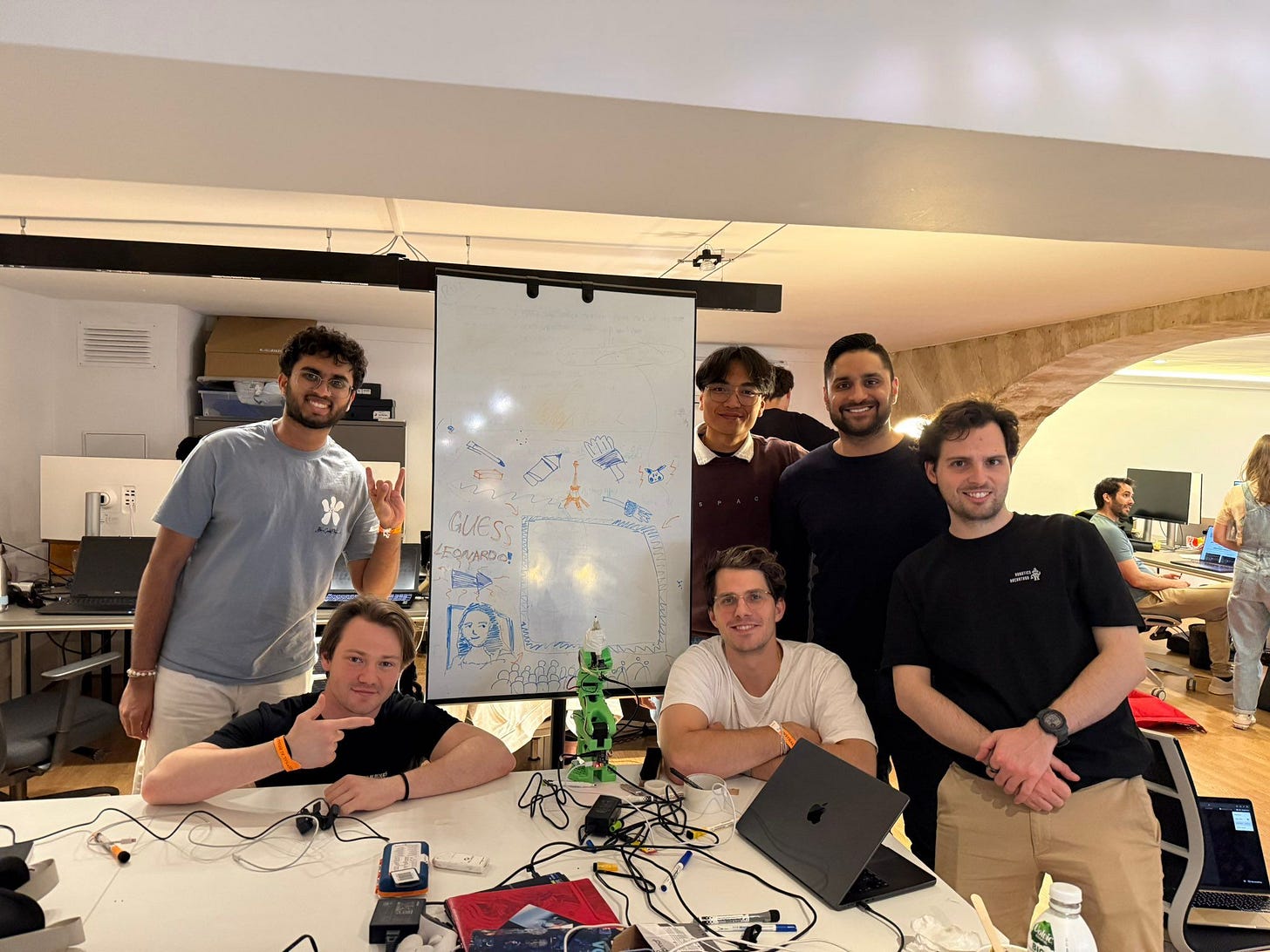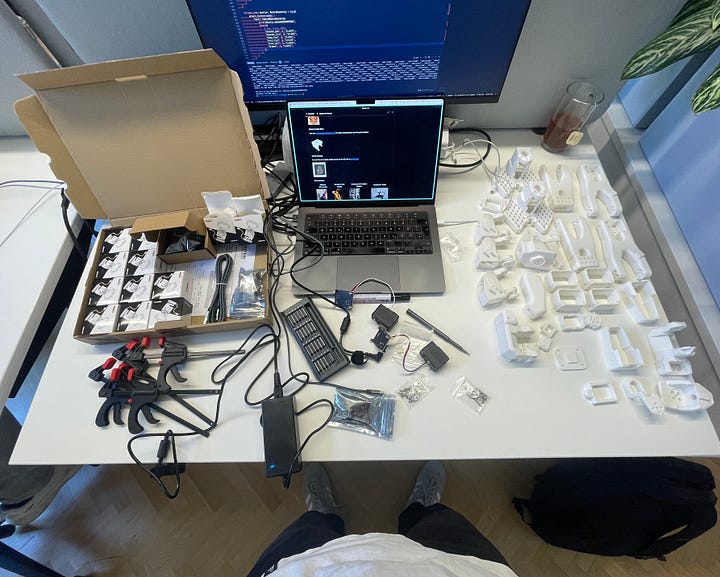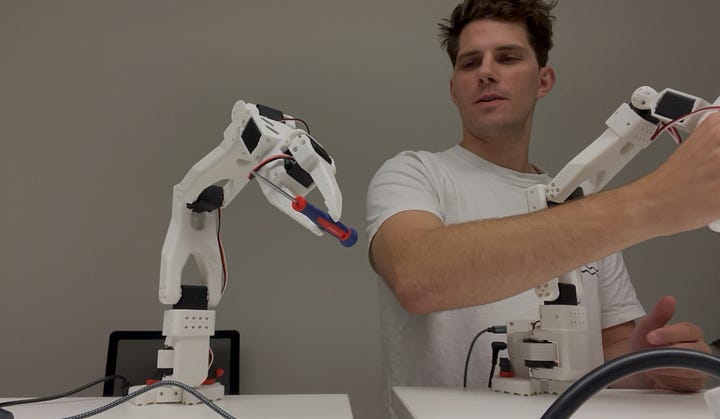Robots and Runway
Finished freelancing. Now spending a month learning about robotics.
Last fall, I decided to focus exclusively on freelancing and build up personal runway. Now I’m finally there. To complete a client project, I even did an extra month and overshot my savings goal.
I now have €45,000, which will last me at least 12 months and also covers extras such as conference travel or compute costs for training larger models.
I deliberately chose not to think about what I wanted to work on while freelancing. Getting excited about an idea only to drop it a few weeks later to focus on a necessary freelance project was too frustrating last fall. However, one topic has been growing on me.
Over the past few months, I’ve seen a lot of impressive robot videos on X, like this one, this one, or this one. Many are demos, but I was surprised to see how much robotics has advanced in recent years and that I hadn’t picked up on it sooner.
What’s interesting to me isn’t the hardware itself, but the algorithms running on the robots. While LLMs’ reasoning abilities are impressive, they can only act in the world of bits and bytes. Embodied intelligence, on the other hand, builds on vision-language models (VLMs) to perceive, reason, and then output actions, allowing robots to interact with their environment.
Training single-task policies has been a major challenge so far. It’s only in the past 1-2 years that people have started thinking about large-scale robotic pretraining and building something akin to a robotic foundation model - Physical Intelligence’s πo.5 model or Tesla’s Optimus offer a glimpse of this.
Where is Europe in all of this?
Watching the videos made me wonder who was building these robots. Some were from Figure, Physical Intelligence, or Tesla in the US; most were from Unitree or DeepRobotics in China. The only bigger and interesting European company is 1X Robotics from Norway, but judging by the fact that 46 out of 54 job openings on its careers page are SF-based, it doesn’t seem very European after all.
Europe has nearly double the number of robots as the US, but has no big company working on general embodied intelligence. Why?
Just as LLMs are transforming knowledge work and becoming central to the economy, robots will be essential for accelerating progress in the physical world. While our generation has already integrated LLMs into daily workflows, many people are only now discovering that tools like ChatGPT can help them write emails.
If adoption is this slow for a web-based consumer product, how long will it take for autonomous robots to gain traction? By the time an Italian or German SME realises it can automate a task it’s struggled to hire for over the past decade, its customers may have already switched to cheaper Chinese alternatives.

We are in the GPT-1 era of robotics
We are still very far away from general-purpose robotics applications. The key ingredient missing is large amounts of robotics data, which is much harder to come by than text is on the web. The barriers to starting to build in robotics are also high. Hardware is expensive, and the software ecosystem around it is far less mature. Robotics is also a very integrative field: you need to be very good in multiple domains to build one decent robot.
But many of the underlying factors are rapidly changing at the moment. LLMs speed up learning new subjects, digesting research, or debugging hardware issues - I can speak from my own experience building a fleet of 20 Raspberry Pis last year. At the same time, hardware is becoming cheaper. The landmark ALOHA paper from 2023 highlighted, as a key contribution, the design of a low-cost arm. How low-cost is it? $10,000! Three weeks ago, I built the SO-100, released by Hugging Face last October, for €200 (see a video here). It’s much smaller but highlights how easy it is to get started.
It feels obvious that robotics will be huge in a few years, so…


Why aren’t more people building in this space?
I’ve got a suspicion, and it comes from my time in Zurich. At ETH, I met some of the smartest people I know. But the smarter they were, the less likely they’d be entrepreneurial. We have so many people in Europe who could build robots and algorithms for them, but most of those who could do so simply won’t.
I struggled a lot in my first year at ETH, and if there’s one thing I learnt - besides math maybe - then it’s that you can become an expert in anything if you’re willing to invest the time. So why not robotics?
The funny thing about a hard problem like this one is that it makes other things easier. Precisely because they’re hard, fewer people try. You don’t have ten teams launching nearly identical products every week. You don’t need perfect design or distribution from day one, because just getting something working at all is rare. Particularly in Europe, this is IMO undervalued and a huge opportunity at the moment.
In robotics, if you can build something that actually does something useful - even if it’s rough - you’re already interesting. The difficulty acts as a moat. And if you’re willing to put in the work and take a long-term view, that’s a real edge. On top of that, Europe is full of exceptional engineers who’d much rather work on autonomous robots than spin up another SaaS backend calling OpenAI.
What I like about this field is that its value is obvious.
That’s not true for most ideas, especially in SaaS, where you sometimes have to squint to convince yourself it’s really making the world better. But here, there’s no hand-waving. The work is valuable, and the way to win is by doing real technical work: building data pipelines, applying research, and finding clever ways to get data.
That’s very different from the other path I’m considering: building an AI agent company. There, the challenge is mostly product - it’s figuring out messy workflows, designing UX, and making sure your product doesn’t break when it calls OpenAI for the hundredth time. That’s interesting in its own way. But I wonder how it holds up when things get hard, as they always do. Two or three years in, when the initial novelty and excitement have worn off, which of the two would I be more excited to build?
I’m likely underestimating how difficult robotics is
There’s still a lot I don’t know about robotics, and a few people have already been telling me that it’s very hard. That’s not a reason not to do it, but I need to figure out what that means exactly and, more importantly, how serious I am about it.
The trickiest part for me at the moment is understanding how much of these thoughts are short-term excitement and how much of this will stick. I know I can get excited about topics only to then lose interest after a month or so. That’s fine, and it’s a side of myself that I like a lot. It’s cool to get excited about things. I just need to stay conscious of that and be fast at testing my excitement.
The only important thing is that I don’t lose more time than necessary to find out why robotics is not as exciting as I currently think. If I do end up walking away from robotics, say, 3 months from now - after burning through a significant chunk of savings - I don’t want it to be for a reason I could have found out about in the first month.
So the question is: What are the possible reasons robotics might not be as promising as I currently think? And how quickly can I test and disprove those assumptions?
My solution: A 1-month robotics speed run
I’m giving myself a month to work on robotics without questioning it and then reevaluate whether to continue. My goals are:
Build a robot arm and teach it to play chess. Building is the best way to learn, and will force me to run into the ‘sharp edges’.
Talk to 30 other founders and builders in robotics to learn more about the problems they’re battling, pain points they’re experiencing, what they’re excited about, and what they think I should be paying more attention to.
Read 10 key papers in robotics to understand where research is, learn about the challenges at the frontier and whether I enjoy this type of research.
I’m keeping a short daily blog on what I do every day and what I learn.
I’ll be writing a long-form structured post here on Substack, but I also wanted to keep a more detailed record of what I’m doing day-to-day. This will be (i) a useful reminder to myself for how I was thinking about things the first time I encountered them, (ii) a way to reflect and keep accountable, and (iii) to shorten the learning journey for anyone else exploring this space after me.
You can find it on my website: thisiscrispin.com/p/daily-robotics-blog
If you know anyone working in robotics - whether building hardware, writing control algorithms, or deploying robots in the real world - I’d love to speak with them. I’m especially interested in founders, researchers, and robotics users.
My top reads
Sequoia’s AI Ascent had a lot of great talks on AI. I particularly enjoyed Jim Fan’s talk on robotics and simulation and Bret Taylor’s talk on agents.
AI 2027 was probably the most-read essay in the last month. It paints a doomy picture of what AI could look like in the next years.
“Agency” is probably the biggest hype word on X at the moment. Ben Kuhn wrote an excellent essay explaining in detail why, in the age of AI, taste and agency are the two big skills that matter.
I also liked Gian’s essay Agency is Eating the World
This Afro House set is my go-to mix for coding at the moment.




What’s your take on NEURA robotics? I was surprised to see how much funding they raised.
OK let's learn together,me too I have been undertaking series of learning most especially Algorithms and Data.